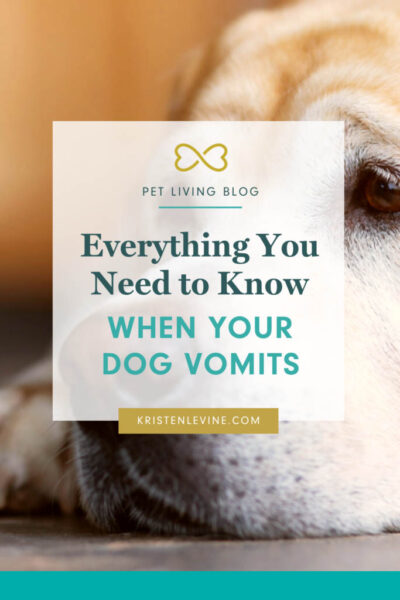
Everything You Need to Know About Your Dog Vomiting
Vomiting is never a fun topic, but as a pet parent, it’s something you’ll probably have to deal with at one time or another. No one likes to see their precious pup feeling poorly, but it’s important to know whether it’s a simple tummy upset versus something more serious. From vomiting versus regurgitation to a dog vomit color guide, here’s everything you need to know when your dog vomits.
Is Your Dog Vomiting or Just Regurgitation?
First off, it’s important to figure out what exactly your pup is doing. Just because it looks like your dog vomited doesn’t mean she actually did. It could just be regurgitation.
Regurgitation usually isn’t a cause for concern, while dog vomiting may mean your furry friend needs a veterinarian’s care. So what’s the difference?
What Is Regurgitation?
Regurgitation is when the food doesn’t even get to your dog’s stomach before coming back up. If you don’t see your dog’s stomach contract, she doesn’t seem nauseated, and the food doesn’t look digested, it’s possibly regurgitation. Often regurgitation appears as though the food “falls” from your pup’s mouth.
What Causes Regurgitation?
Regurgitation can happen when your dog eats too much or too quickly. It can also happen when a pup is too excited or stressed out. Although regurgitation can be due to these causes, it’s important to remember that frequent regurgitation can be a sign of a more serious medical problem. If your dog regurgitates daily, or after most meals, it’s time to check in with your veterinarian.
How Can You Tell if It’s Your Dog Vomiting and Not Regurgitating?
There are several signs to watch out for to determine if your dog is truly vomiting
First, just like humans get nauseous before they throw up, your dog will probably let you know they’re not feeling well. If you see your fur friend drooling, swallowing a lot, and licking her lips, she may be feeling nauseous.
When dogs vomit, if there is any food, it will likely be partially digested, and you’ll see their stomach muscles contract (unlike with regurgitation). They will often retch before or after vomiting, which generally does not happen with regurgitation. If you are unsure, try to take a video of the episodes, so you can show your veterinarian at your appointment.
If your dog has actually vomited and not just regurgitated, as awful as it sounds, it’s time to take a closer look.
What Does the Color of Dog Vomit Mean?
There are a lot of different colors you may see when your dog throws up. As tempting as it may be to just clean it all up without examining things too closely, the color and type of vomit can help you figure out what’s ailing your canine companion – and if she needs a veterinarian’s help.
Dog Vomit Color Guide
White, foamy: If your dog’s vomit is white and foamy, this can be caused by your pup having too much stomach acid or too much saliva. This can also be the main type of vomiting seen when dogs get car-sickness.
Yellow: This is most common if your pup has an upset stomach due to her tummy being empty. You’re most likely to see this early in the morning before she’s had a chance to eat.
Clear: This is usually mostly water and is common when your pup’s tummy is so upset they can’t keep water down.
Green: Most often this is due to your dog eating grass (which some dogs do when they feel nauseous). It also can be caused by bile from their small intestine that has backed up into their stomach.
Red or Pink: If your dog isn’t eating any red kibble or treats, this is most likely caused by blood in the vomit. This is always a cause for concern, and you should take your dog to your veterinarian immediately.
Brown or Black: Black or brown vomit can have different causes, so be careful. It could just be the color of their food. It also can mean your dog has eaten soil or poop. However, black or brown vomit can also be caused by traces of blood. If your dog’s vomit looks more like coffee grounds, this is usually caused by blood, and you should take your dog to your veterinarian immediately.
Types of Dog Vomit
| Type of Vomit | Description | Possible Causes |
| Chunky | Contains undigested food particles, ranging from oatmeal-like consistency to full undigested kibbles | Overeating, digestive issues. May mean something is preventing the food from passing through the stomach and intestinal tract |
| Liquid | Thin and watery, sometimes clear or yellowish | Empty stomach, bilious vomiting syndrome.May be accompanied with abdominal pain, lethargy, etc. |
| Slimy | Mucus or saliva is present | Usually because of drool that’s pooled in the stomach. Excessive drooling might be indicative of another major disease. |
Pin Me!

Why Is My Dog Vomiting?
Unfortunately, there’s no single answer on what causes vomiting in dogs. Dogs vomit for a variety of reasons, ranging from the relatively benign to the serious.
Just like with humans, eating something new or something that doesn’t agree with her can make your dog throw up. Add in the fact that dogs often eat things they shouldn’t, and you have a recipe for tummy troubles. Something as simple as motion sickness can also cause vomiting in dogs.
If your dog vomits over and over or is showing other signs like lethargy, lack of appetite, pain in the tummy area, or bloating, that’s more alarming and could indicate a bigger underlying problem that needs a veterinarian’s help.
Causes of Dog Vomiting
Here’s a list of other possible causes of why a dog vomits:
- Diet change: A sudden switch in food can cause an upset stomach in your pup.
- Food allergies or intolerance: Allergy to specific certain ingredients.
- Infections: Dog vomiting can be due to parasites like roundworms or viral or bacterial infections.
- Heatstroke: Overheating can cause vomiting.
- Toxins: Ingestion of poisonous substances or unsafe foods.
- Diseases: Systemic conditions like pancreatitis, cancer, liver disease, or kidney disease or failure.
- Foreign Objects: Ingesting non-edible items like toys or bones.
- Viral infections: Such as distemper or parvovirus.
- Medication reactions: Adverse effects from drugs.
- Stress or anxiety: Can trigger vomiting in some dogs.
- Seizures: Dogs can vomit before, during, or after seizure activity.
Acute Vomiting vs. Chronic Vomiting
If your pup is vomiting severely out of nowhere, she is experiencing acute vomiting. This type of vomiting in dogs can signal various medical concerns such as ingestion of toxins, dietary indiscretions like eating spoiled food, trash, or chocolate, contagious infections, intestinal parasites, or bloating. Acute vomiting can also be the first sign of other systemic disease, such as cancer or other organ failure (liver, kidney).
Chronic vomiting, on the other hand, is when your dog throws up often over a certain period. It can be indicative of many different things, like inflammatory bowel disease, megaesophagus (enlarged esophagus), or pancreatitis. Some dogs are also prone to chronic vomiting, but there is almost always a medical reason – check in with your veterinarian if you are not sure.
Both types of vomiting are concerning and often require veterinary intervention, especially if accompanied by symptoms like blood in the vomit or abdominal pain. Monitor your dog closely and consult with a veterinarian if vomiting persists or is associated with other signs of illness.
When Should You Be Concerned About Your Vomiting Dog?
The biggest thing to look out for if your dog is throwing up is frequency. Did your furry family member have a single unfortunate episode and then go about her business as if nothing happened? Or is your dog throwing up again and again?
A single tummy upset is likely not a cause for concern.
There are warning signs you should watch out for, though. Contact your veterinarian if your dog:
- tries to throw up but can’t
- is lethargic
- vomits up a foreign object, like a piece of plastic or cloth
- is projectile vomiting
- vomits blood
- is peeing less or showing other signs of dehydration
- can’t hold down any water
- refuses all food
- has a swollen, painful, or bloated abdomen
Vomiting in Puppies and Senior Dogs
A puppy, a dog with medical issues, or a senior dog vomiting is a serious matter. Puppies are at risk for serious diseases like parvovirus, while senior dogs are at greater risk due to potential chronic health issues. Any vomiting in these groups should prompt a veterinary consultation to ensure proper care and treatment.
How to Treat Vomiting in Dogs
Your dog’s treatment will depend on what’s causing her vomiting. Your dog throwing up isn’t a disease itself—it’s only a symptom. That’s why it’s important to figure out what’s causing the vomiting.
If your pup decided to race around the house right after a big meal and then threw up, you probably don’t need to do anything at all. The same is true if it was caused by eating something that didn’t agree with her.
There are many tests your veterinarian can do when your dog’s vomiting isn’t caused by something obvious. If your dog’s tummy woes are caused by inflammation or irritation in her digestive system, your veterinarian may prescribe a bland diet and possibly anti-nausea medicine.
Some causes may require more extensive care. For example, if your pup has become dehydrated or if the vomiting is caused by an underlying medical condition, they may need to be hospitalized. Vomiting caused by eating a plastic toy or another non-food item could require surgery.
Especially if your pup is a chewer or has a habit of getting into things they’re not supposed to, you may want to consider pet insurance to cover those veterinary costs. Personally, I use Healthy Paws Pet Insurance for my pets’ unexpected problems.
The Tail End
No one likes to deal with vomit, but it can let you know your pup’s been into something they shouldn’t, or it can be a warning sign of a more serious medical condition. By recognizing the difference, pup parents can know how best to help their furry friends stay happy and healthy for many years to come.
Would you like to know more about how to enjoy your best life together with your dog? Then download your free ebook below!








Comments (0)